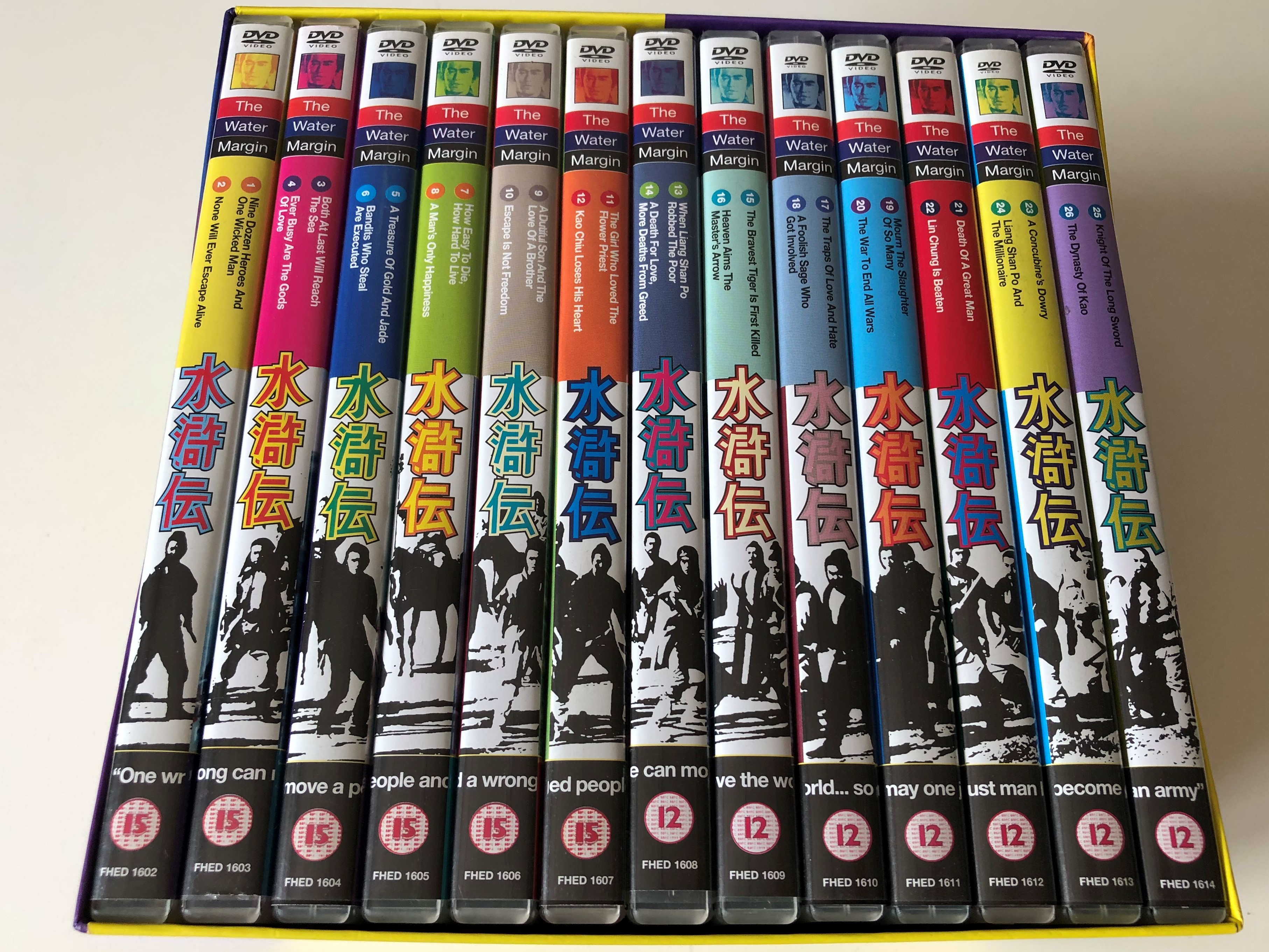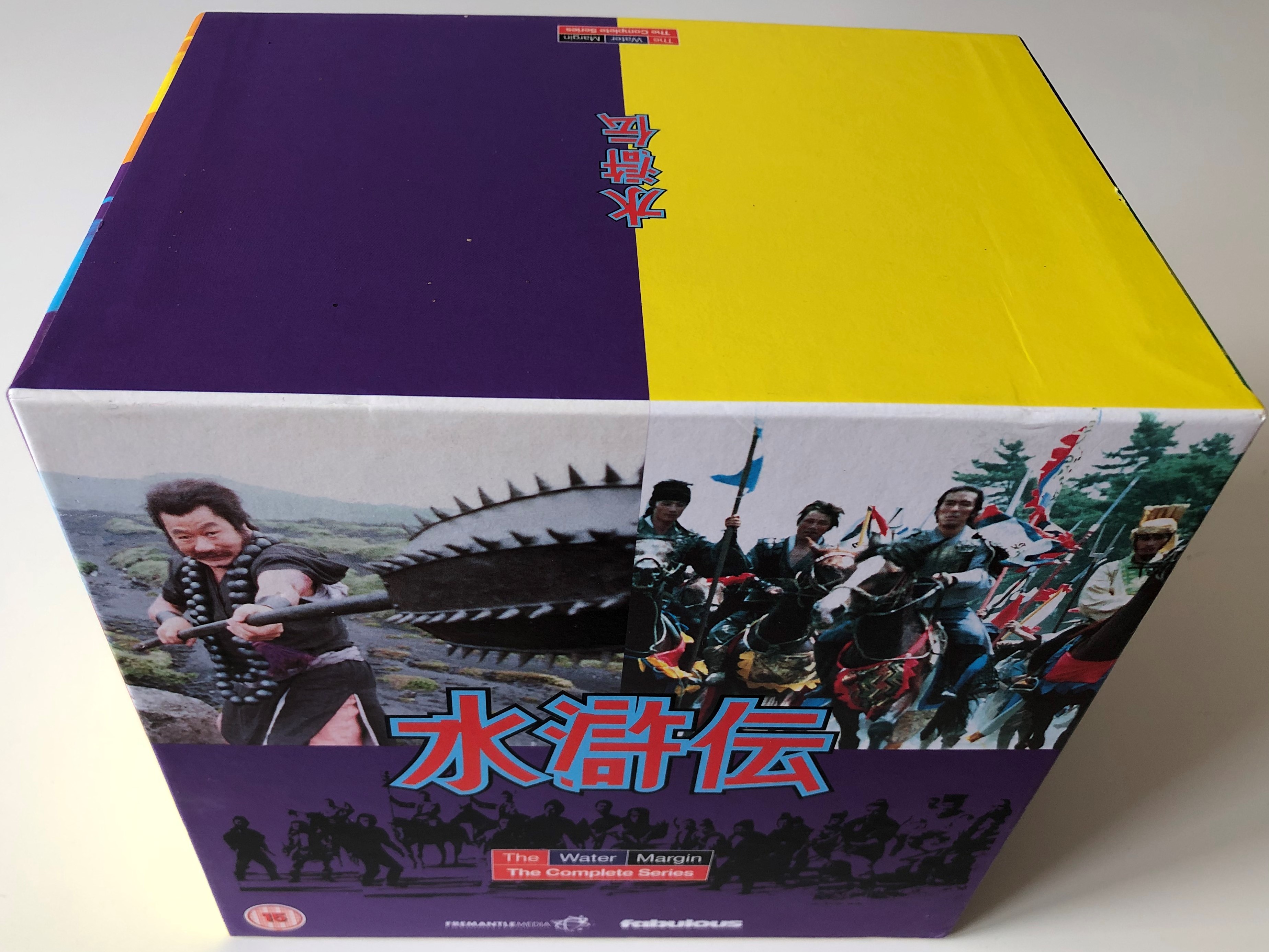Description
The Water Margin 1973 DVD BOX SET 水滸傳 Complete Series / 13 DVD Discs / Starring: Atsuo Nakamura, Sanae Tsuchida, Kei Satō, Isamu Nagato
UPC 5030697008619
REGION 2 PAL DVD
MADE IN THE UK
AUDIO: English
Total Runtime: 62 minutes
!!! Condition of this DVD BOX is USED VERY GOOD - Discs are LIKE NEW inside the cases !!!
English Summary:
The Water Margin is a Japanese television series based on Water Margin, one of the Four Great Classical Novels of Chinese literature. Made in two seasons of 13 episodes each by Nippon Television it was shown in Japan in 1973 and 1974 as Suikoden (水滸伝).
The novel details the trials and tribulations of 108 outlaws during the Song Dynasty. This adaptation follows Lin Chung (Atsuo Nakamura) and his clashes with the local government official Kao Chiu (Kei Satō).
For an English-language version, it was adapted by David Weir without translations, using only brief plot synopses. The dubbed version, narrated by Burt Kwouk, was shown by the BBC from 1976 to 1978.An English novelisation, written by Weir, was released in 1978 as Water Margin.
The Water Margin is known for its sometimes obscure, but memorable philosophical quotes, such as "Do not despise the snake for having no horns, for who is to say it will not become a dragon?"
DVD BOX SET CONTAINS All 26 episodes from the 1970s TV series about a gang of outlaw heroes dedicated to fighting tyranny in feudal China. In 'Nine Dozen Heroes and One Wicked Man' Kao Chiu, the Emperor's favourite, unwittingly releases the souls of nine dozen rebel knights from the tomb in which they had been sealed. 'None Will Ever Escape Alive' has Lin Chung faced with the choice of joining the rebels, escaping, or accepting his sentence. 'Both At Last Will Reach the Sea' finds Lin Chung searching for his wife, while being pursued by Yung Chih, who has orders to kill him. 'Ever Busy Are the Gods of Love' sees the rebel heroes attempt to rescue the captured Shih Chin, who got himself in trouble when he tried to find his true love. In 'A Treasure of Gold and Jade' the evil Kao Chiu plots to become Prime Minister as well as head of the army. 'Bandits Who Steal Are Executed' has Kao Chiu dispatch his forces to all corners of the empire in search of stolen treasure. 'How Easy to Die, How Hard to Live' finds Kao Chiu drawing up another plan against Liang Shan Po. 'A Man's Only Happiness' sees Sung Chiang captured by the bandits. 'A Dutiful Son and the Love of a Brother' has Lin Chung gather increasing numbers of recruits, which annoys his arch rival. 'Escape is Not Freedom' finds the Tiger Hunter expressly disobeying Lin Chung's instructions when he arrives at Chiang Chow Jail. 'The Girl Who Loved the Flower Priest' sees the cruel band of bandits under the control of Chin Mao Hu wreaking further havoc throughout the kingdom. In 'Kao Chiu Loses His Heart' Kao Chiu's obsession with the destruction of Lin Chung and his outlaws is increasing, and it leads to a betrayal of the bandits after some evil double-dealing on Kao Chiu's part. 'When Liang Shan Po Robbed the Poor' finds Kao Chiu planning to overthrow the Prime Minister, and robbing several tax collectors in a fit of pique, which draws in Lin Chung to investigate. 'A Death for Love' has Tai Tsung and Yen Li caught in the web spun by Kao Chiu; meanwhile, back in the capital, the Prime Minister accuses Kao of conspiring to steal taxes. 'The Bravest Tiger is First Killed' sees the squire of Kuang Pow ordered by Kao Chiu to end the recent raids on the tax collections in his province. In 'Heaven Aims the Master's Arrow' Squire Kuang and his brothers set a trap for Lin Chung and Hua Yung. 'The Traps of Love and Hate' finds the Great Duke Chai Huen Chen's nephew Sai Chin suspected of being a Liang Shan Po sympathiser. 'A Foolish Sage Who Got Involved' has a mongol warrior employed to claim back rich provinces for the state and also to wipe out any who stand against the Duke. 'Mourn the Slaughter of So Many' sees China increasingly threatened by the Hun forces. In 'A War to End All Wars' Hong and his son travel to see Kao Chiu in order to offer him the power of gunpowder. 'Death of a Great Man' finds old enemies doing deals to repel the threat from the Tsung army, which has fought its way from the borders of Manchuria all the way into China. 'Lin Chung is Beaten' has Chao Kai assassinated and Kao Chiu riding swiftly to Tung-Chi to gloat over his victory. 'A Concubine's Dowry' sees Kao Chiu continuing to corrupt the boy Emperor, who soon becomes infatuated with Li Chih. 'Liand Shan Po and the Millionaire' has the Tattooed Dragon return Feng Hsien safely to her father and Liang Chung Shu openly accuses Lu Chin-I of treason. 'Knight of the Long Sword' sees Kao Chiu declare martial law in the capital city. Finally, in 'The Dynasty of Kao', the nine dozen heroes of the Water Margins gather to the south of the capital city, while Kao flees to the desert and Lin Chung rides to confront him one more time.
Japanese Summary:
『水滸伝』(すいこでん)は、1973年から1974年にかけて日本テレビ系列で、日本テレビ開局20周年記念番組として中村敦夫主演で放映されたテレビドラマである。全26話。放送時間は毎週火曜21:00 - 21:54。この枠は長きに渡って前後半体制で、1時間枠になったのは1967年から1968年に放送された『ローンウルフ 一匹狼』以来5年振り。
大まかなストーリーの流れは中国の古典文学、施耐庵作の水滸伝にのっとってはいたが、林冲(りんちゅう・劇中では「林中」と表記)を主役としており、一丈青扈三娘(演じたのは土田早苗)がヒロインとして最初から登場するなど、独自のストーリー展開の部分も相当多い。また、末尾で高求が林中たち梁山泊軍に斬られるという原作とは全く異なるストーリーになっている。[2]。また多すぎるキャストのため、登場しなくなるキャラクターも少なくなかった。
水滸伝を題材にした横山光輝の漫画作品を原案としており、オープニングで原案:横山光輝とクレジットされている。ドラマの題字は横山光輝作品と共通である。
海外では1977年、イギリスBBCで初放映された他、香港でも上映された。また、オリジナル版主題歌「夜明けを呼ぶもの」を英語詞にした、ゴダイゴが担当した英語版の主題歌「水滸伝のテーマ」がヒットしている[3]。
脚本が出版され、更に2008年、DVD-BOXが発売されている。
Series 1
The first ten episodes were shown on the BBC from 21 September 1976 to 23 November 1976. The final three episodes were shown just before series 2 from 20 September 1977 to 4 October 1977.
| No. | Title | BBC airdate |
|---|---|---|
| 1 | "Nine dozen heroes and one wicked man" | 21 September 1976 |
| 2 | "None ever escape alive" | 28 September 1976 |
| 3 | "Both at last will reach the sea" | 5 October 1976 |
| 4 | "Ever busy are the gods of love" | 12 October 1976 |
| 5 | "A Treasure of gold and jade" | 19 October 1976 |
| 6 | "Bandits who steal are executed" | 26 October 1976 |
| 7 | "How easy to die, how hard to live" | 2 November 1976 |
| 8 | "A man's only happiness" | 9 November 1976 |
| 9 | "A dutiful son and the love of a brother" | 16 November 1976 |
| 10 | "Escape is not freedom" | 23 November 1976 |
| 11 | "The girl who loved the flower priest" | 20 September 1977 |
| 12 | "Kao Chiu loses his heart" | 27 September 1977 |
| 13 | "When Liang Shan Po robbed the poor" | 4 October 1977 |
Series 2
On the BBC series 2 followed on from series 1, shown from 11 October 1977 to 3 January 1978.
| # | Title | BBC airdate |
|---|---|---|
| 1 | "A death for love, more deaths from greed" | 11 October 1977 |
| 2 | "The bravest tiger is first killed" | 18 October 1977 |
| 3 | "Heaven aims the master's arrow" | 25 October 1977 |
| 4 | "The traps of love and hate" | 1 November 1977 |
| 5 | "A foolish sage who got involved" | 8 November 1977 |
| 6 | "Mourn the slaughter of so many" | 15 November 1977 |
| 7 | "The war to end all wars" | 22 November 1977 |
| 8 | "Death of a great man" | 29 November 1977 |
| 9 | "Lin Chung is beaten" | 6 December 1977 |
| 10 | "A concubine's dowry" | 13 December 1977 |
| 11 | "Liang Shan Po and the millionaire" | 20 December 1977 |
| 12 | "Knight of the long sword" | 27 December 1977 |
| 13 | "The dynasty of Kao" | 3 January 1978 |
Cast
- Atsuo Nakamura : Lin Chong
- Kei Satō : Gao Qiu
- Sanae Tsuchida : Hu Sanniang
- Tetsuro Tamba : Huyan Zhuo
- So Yamamura : Lu Junyi
- Takahiro Tamura : Chai Jin
- Go Wakabayashi : Guan Sheng
- Takeshi Obayashi : Song Jiang
- Hajime Hana : Wu Song
- Atsushi Watanabe : Ruan Xiaoqi
- Isao Yamagata : Chao Gai
- Toshio Kurosawa : Dai Zong
- Teruhiko Aoi : Shi Jin
- Makoto Sato : Yang Zhi
- Sei Hiraizumi
- Kin Sugai
- Kei Taguchi
- Kōji Nanbara
- Akiji Kobayashi
- Toru Abe
- Susumu Kurobe
- Nobuo Kawai
- Yutaka Mizutani : Emperor Huizong of Song
| Genre | Costume drama, martial arts |
|---|---|
| Written by | Shi Nai'an (original novel) |
| Starring | Atsuo Nakamura Sanae Tsuchida Kei Satō Isamu Nagato |
| Theme music composer | Masaru Sato |
| Country of origin | Japan |
| No. of seasons | 2 |
| No. of episodes | 26 |
| Production | |
| Running time | 45 minutes per episode |
| Release | |
| Original release | 1973–1974 (Japan) 1976–1978 (UK) |




















































